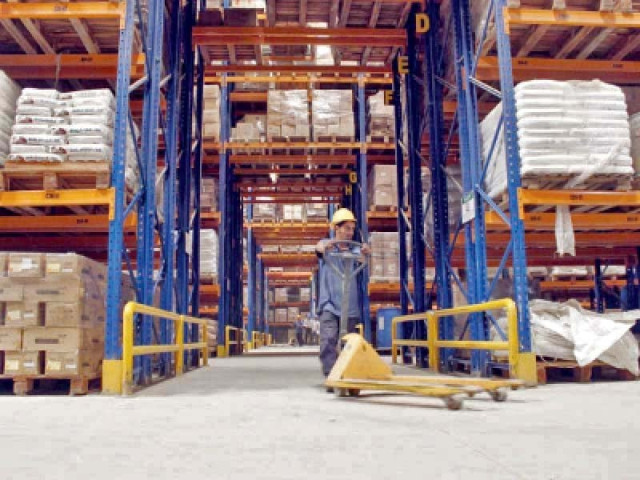Warehousing thrives; SMEs struggle
High electricity cost, rent force small companies to relocate to low-rent areas

While the pressure is growing on the government to unlock billions of dollars in emergency financing from the International Monetary Fund (IMF), small industries running on rental arrangement are feeling the heat of the rupee’s deep depreciation, towering utility tariff and high commodity prices.
“Many units have either closed operation or relocated to low-cost properties due to a shortage of funds,” said Industrial Estate Dealer, Ali Usama while speaking to the Express tribune.
“I have been handling rentals for Karachi’s different industrial areas for quite some time but have never seen such gloom - especially in the areas with a number of relocations,” he added.
Other industrial property agents also held similar views about the anguish being faced by small business owners. Apart from large companies, only those with warehousing facilities in the industrial areas are content. “At least, they have a monthly rental income and are free from the tension of high electricity bills,” they said.
The financial fragility of many small businesses, and the significant impact the economic uncertainties had on them, have pushed the small industry in to the middle of a fund crisis. They are unable to feed the cost of high rent and the ever-increasing cost of electricity ultimately forced businesses to shift to low-rent properties.
People invest in real estate for price appreciation as well as rental income. Industrial properties in the right location, and with relevant facilities like gas and electricity, attract quality tenants and can fetch very good rental returns.
Based on information received from different quarters, it appears that there has been a considerable boom in warehousing despite rent for industrial property falling within the range of small businesses even a few years ago. The electricity tariff, however, was also reasonably low back then.
Now, with a substantial rise in prices in the real estate market, rent is touching the sky and small businesses are looking for cheaper facilities. Moreover, small industries like plastic moulding, recycling, low-scale textile manufacturing, corrugated box manufacturing and many more producers are unable to pay the high price of electricity and maintain a minimum workforce of 250 employees and 50 for small companies. Subsequently, they are closing businesses and moving to place suitable to their budgets. Besides, there are a large number of food manufacturing companies that fall in this category as well.
Karachi Chamber of Commerce and Industry (KCCI) President Mohammed Tariq Yousuf said that, “SMEs working on rented premises are unable to run their businesses due to the high rate of electricity. Those who are working on rented premises are struggling to cope with cost of doing business.”
“The SME sector is already suffocating due high electricity rates for industrial consumers. Those working on rented premises are unable to catch up to the pace of large-scale companies as they have to pay rent along with a huge monthly bill. Consequently, they are vacating those premises and either closing businesses or moving to a cheaper property,” he added.
The KCCI president added that, “Still, till date, factory owners have remained untouched by the pressure as they don’t have to pay rent. Although the situation is not extreme enough for the companies to start disposing of machinery. Yet, I fear, if the current stream of economic situation persists, we will see the closure of many small, medium and large sized companies soon.”
Several themes emerged while trying to explore the impact of economic situation on small businesses. As a first, the owners of these businesses opt for mass layoffs. Secondly, closures already occurred just within a year of this intense measure of fund crisis, with an increasing trend of renting out free spaces for the purpose of warehousing. In a smart business move, the risk of closure was defied positively by keeping the earning momentum intact.
However, as the country’s economy has been going through a tough phase over the past few years, businesses have widely disturbing predictions about the length of this crisis. Consequently, warehouse boomtowns are shooting up in all industrial areas starting from Karachi’s main industrial trading estates to main super highway stretching to Bin Qasim Industrial Zone.
Apart from that, small firms face challenges in terms of cost of running business. Renting premises involves less capital than buying a property, which means small business owners, can invest the amount in the business instead. It also provides flexibility to relocate easily by maintaining cost-efficient methods of running the business.
Warehousing has been largely supplemented by the rise of e-commerce. Its demand was amplified further with the growing trend of startups – most of which require storage facilities – both dry and cold. Interestingly, despite the gruelling conditions, warehousing facilities seem to be the winners of the topsy-turvy economic events.
Published in The Express Tribune, May 26th, 2023.
Like Business on Facebook, follow @TribuneBiz on Twitter to stay informed and join in the conversation.



















COMMENTS
Comments are moderated and generally will be posted if they are on-topic and not abusive.
For more information, please see our Comments FAQ